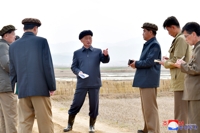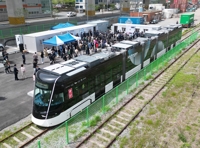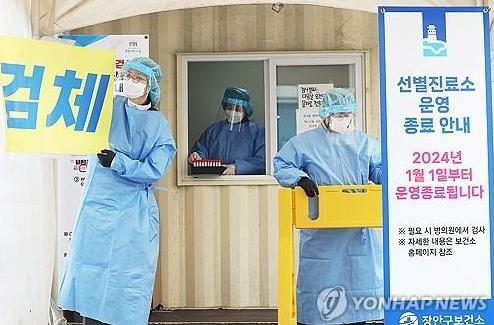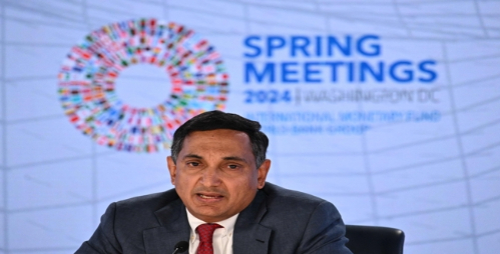(LEAD) (News Focus) S. Korea, U.S. free trade deal up for negotiation
(ATTN: UPDATES with more details in last 7 paras)
By Kim Kwang-tae
SEOUL, July 1 (Yonhap) -- U.S. President Donald Trump has made it official that the free trade deal with South Korea is up for renegotiation, setting the stage for a tough tug-of-war between the two trade partners amid growing concerns that Washington is turning to protectionism to secure its industries and jobs.
The deal -- which went into effect in 2012 -- has widely been considered a symbol of the economic bond between the two countries that have maintained a close military alliance for decades. But the fate of the original free trade agreement (FTA) was sealed when Trump vowed to fix or scrap the pact on the grounds that it has favored Seoul and resulted in a massive U.S. trade deficit with South Korea.
On the campaign trail, Trump denounced the free trade pact as a "job-killing" deal and a "disaster," sparking concerns in Seoul that he could push for a renegotiation of the landmark accord.
On Friday, at the summit meeting with South Korean President Moon Jae-in in Washington, Trump said South Korea and the U.S. are already in talks to renegotiate the agreement.
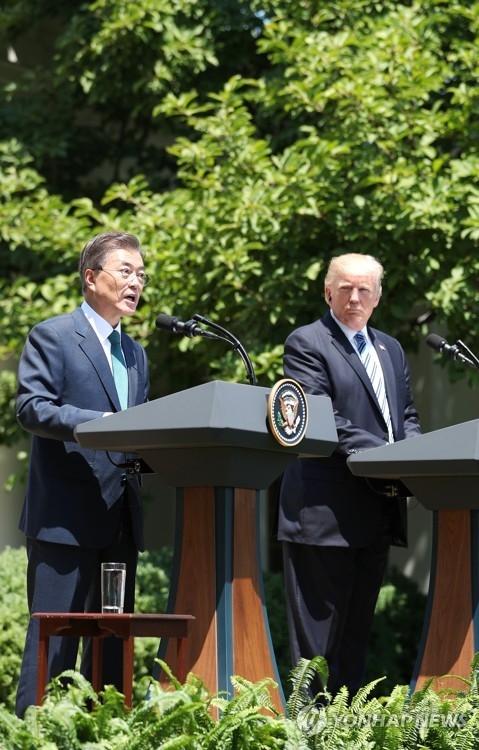
South Korean President Moon Jae-in (L) and U.S. President Donald Trump hold a joint press conference following their bilateral summit at the White House on June 30, 2017. (Yonhap)
"We are renegotiating a trade deal right now as we speak with the South Koreans and hopefully it will be an equitable deal, it will be a fair deal to both parties," Trump told reporters at the start of the one-on-one talks with his South Korean counterpart at the White House.
At their first summit, the trade deal emerged as a key agenda item, along with North Korea's ever-evolving nuclear and long-range missile threats.
Trump said the trade deal has been rough for the U.S., noting that the North American country's trade deficit with the Asia's fourth-largest economy has increased by more than $11 billion between 2011, a year before the FTA went into effect, and last year.
South Korea's current account surplus with the U.S. fell to $31.15 billion in 2016 from $33.03 billion a year earlier. The 2016 figure marked the lowest since 2012, when the corresponding figure came to $19.04 billion, according to South Korean data.
Seoul's central bank has recently said a drop in the export of South Korean cars and steel products is the reason behind the decline in the current account surplus with the U.S.
Autos and steel products are likely to be key issues between South Korean and U.S. officials during negotiations.
"South Korean companies sell cars in America. American companies should have that same exact privilege on a reciprocal basis," Trump argued.
Trump said Moon gave him assurances that South Korea will work to create a level playing field.
The U.S. claims there are non-tariff barriers to U.S. car exports to South Korea, but it remains unclear whether alleged non-tariff barriers or consumer preferences are behind a relatively poor sale of U.S. cars in South Korea.
For many years, South Koreans have preferred luxury European and Japanese brands over American ones. In April, the top three best-selling foreign vehicles models in South Korea were Mercedes-Benz's E220d, BMW's 320d and Lexus' ES300h, according to the Korea Automobile Importers and Distributors Association.
South Korea's top automaker, Hyundai Motor Co., is widely viewed by many Americans as a key source of an imbalance in bilateral auto trade.
Still, Hyundai Motor contributed to the U.S. economy by creating more than 100,000 jobs and investing more than US$12 billion in the U.S. with a commitment to invest another $3 billion, according to Jeffrey Jones, former chairman of the American Chamber of Commerce in South Korea.
The U.S. has imposed a series of anti-dumping duties on Korea-made steel products, citing that excessive imports of steel threatened the country's national security.
Some analysts said South Korea could push for U.S. concessions in the service sector as its service balance deficit with the U.S. rose to $14.28 billion in 2016 from $14.09 billion a year earlier.
Local think tanks have said there are some things that South Korea can ask if the open pact treaty is renegotiated. Besides the service sector, Seoul can move to address concerns surrounding the Investor-State Dispute Settlement that is part of the bilateral FTA.
An ISD clause permits private companies to take governments to an independent international tribunal to arbitrate disputes if they feel measures taken by authorities conflict with the spirit of the FTA and cause damage.
At the time of the FTA's signing, Seoul said such provisions are included in most free trade deals to ensure protection of business investments, but many progressive civic groups and some businesses argued the ISD could adversely affect state policy.
Whatever the future holds, many in South Korea believe that the FTA will likely be altered, and although the outcome of talks cannot be determined at this juncture, Seoul may find itself making concessions that could affect its trade relations with its key economic partner.
"Both countries will likely engage in some tough talks, yet Seoul in the end may find itself meeting at least some of Washington's demands," a local trade expert, who declined to be identified, said.
He, however, stressed that South Korean negotiators need to strive to maintain the so-called balance of interest that is integral to all trade pacts.
"If South Korea relents on something it should try to win in other areas," the source said.
entropy@yna.co.kr
(END)
-
 Defense chief says N. Korea's hypersonic missile 'unsuccessful' in last-stage glide flight
Defense chief says N. Korea's hypersonic missile 'unsuccessful' in last-stage glide flight -
 Relax, immerse yourself in scents at Venice Biennale's Korean Pavilion
Relax, immerse yourself in scents at Venice Biennale's Korean Pavilion -
 Overdue debut of Korean abstract art pioneer Yoo Young-kuk at Venice Biennale
Overdue debut of Korean abstract art pioneer Yoo Young-kuk at Venice Biennale -
 N. Korea has capability to genetically engineer biological military products: U.S. report
N. Korea has capability to genetically engineer biological military products: U.S. report -
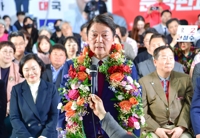 PPP lawmaker says entire Cabinet should resign over general elections defeat
PPP lawmaker says entire Cabinet should resign over general elections defeat
-
 Relax, immerse yourself in scents at Venice Biennale's Korean Pavilion
Relax, immerse yourself in scents at Venice Biennale's Korean Pavilion -
 Overdue debut of Korean abstract art pioneer Yoo Young-kuk at Venice Biennale
Overdue debut of Korean abstract art pioneer Yoo Young-kuk at Venice Biennale -
 Defense chief says N. Korea's hypersonic missile 'unsuccessful' in last-stage glide flight
Defense chief says N. Korea's hypersonic missile 'unsuccessful' in last-stage glide flight -
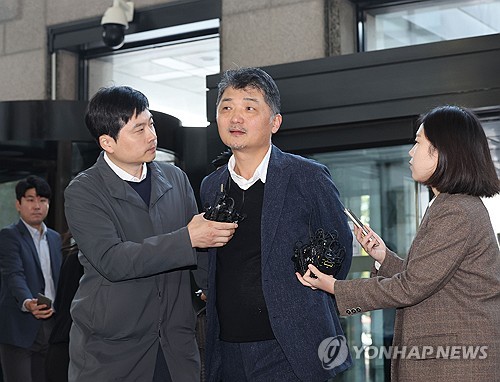 Questioning necessary for Kakao founder for suspected stock rigging: prosecution
Questioning necessary for Kakao founder for suspected stock rigging: prosecution -
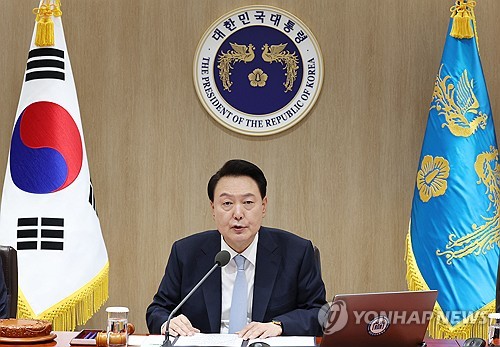 (LEAD) Yoon vows to improve communication with people after election defeat
(LEAD) Yoon vows to improve communication with people after election defeat
-
 S. Korea to provide 100,000 tons of rice to 11 nations
S. Korea to provide 100,000 tons of rice to 11 nations -
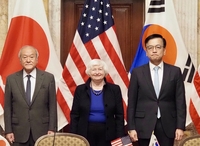 (4th LD) Finance chiefs of S. Korea, U.S., Japan recognize 'serious' concerns over 'sharp' won, yen depreciation
(4th LD) Finance chiefs of S. Korea, U.S., Japan recognize 'serious' concerns over 'sharp' won, yen depreciation -
 Facebook page unveils photos of BTS member V in counter-terrorism unit gear
Facebook page unveils photos of BTS member V in counter-terrorism unit gear -
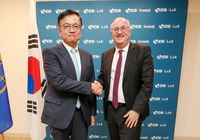 S. Korea to provide US$200 million in humanitarian aid to Ukraine this year
S. Korea to provide US$200 million in humanitarian aid to Ukraine this year -
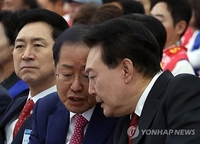 Yoon, Daegu mayor met to discuss post-election matters: sources
Yoon, Daegu mayor met to discuss post-election matters: sources















